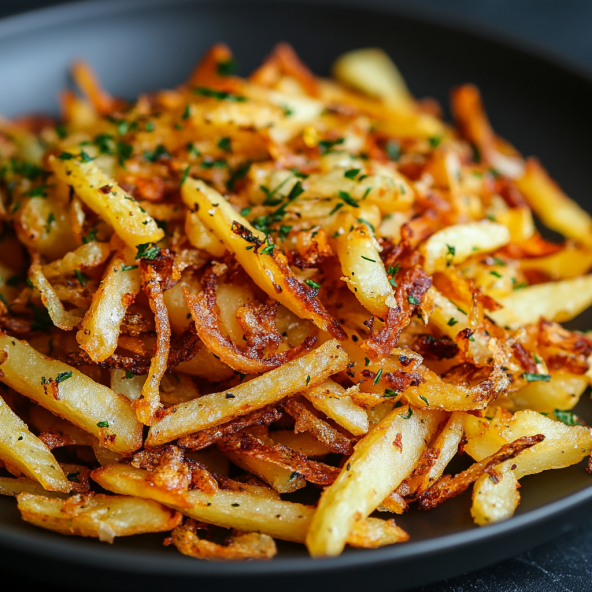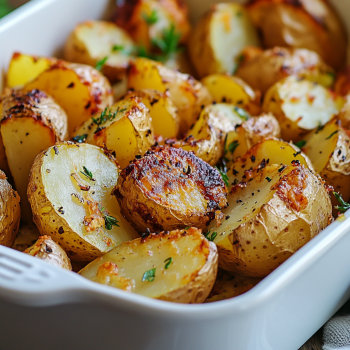What Are Russet Potatoes Best For?
Russet potatoes are one of the most popular varieties of potatoes, prized for their versatile culinary uses and distinct texture. Known for their high starch content, they are perfect for a wide range of dishes. In this article, we will explore what russet potatoes are best for, highlighting their physical characteristics, nutritional benefits, and various culinary applications.
Table of Contents
Introduction
Russet potatoes are a starchy potato variety, characterized by their large size and rough, brown skin. They are typically oval-shaped and have a dense, dry texture that makes them a staple in many kitchens. Known for their versatility, russet potatoes are ideal for baking, mashing, and frying. Their high starch content gives them a unique ability to turn fluffy when cooked, making them a favorite for comfort foods.
Their versatility in cooking comes from their ability to absorb flavors while retaining their texture, making them a top choice for many different recipes.
Physical Characteristics of Russet Potatoes
When considering what are russet potatoes best for, it is essential to understand their physical features. Russets have thick, rough skin that is dark brown in color, making them easy to identify. Inside, their flesh is white or pale yellow and has a high starch content.
- Skin texture: Thick and rough, perfect for baked potatoes with crispy skin.
- Flesh texture: Dry and fluffy when cooked, ideal for mashed potatoes.
- Shape and size: Larger and oval-shaped, suitable for mashing, baking, and cutting into fries.
These characteristics allow russet potatoes to be used in a variety of ways depending on the desired texture and cooking method.
Nutritional Benefits
Provide several nutritional benefits, making them a good option for those seeking healthy, satisfying meals. Packed with essential nutrients, they offer energy-boosting carbohydrates and more.
Calorie Content and Macronutrient Profile
When asking what are russet potatoes best for nutritionally, consider their calorie and macronutrient content. A medium-sized russet potato contains approximately 160 calories, making it a relatively low-calorie food option.
- Carbohydrates: 37 grams, mainly from starch, which gives russet their fluffy texture.
- Protein: 4 grams, contributing to muscle repair and maintenance.
- Fat: Only 0.2 grams, making them a low-fat food option.
The combination of these macronutrients makes russet potatoes a great choice for energy and fulfilling meals.
Vitamins and Minerals Found in Russet Potatoes
In addition to being a great source of macronutrients, potatoes are rich in vitamins and minerals. They are an excellent source of vitamin C, potassium, and B vitamins.
- Vitamin C: Supports immune function and collagen production.
- Potassium: Helps regulate blood pressure and muscle function.
- B Vitamins: Vital for energy production and brain function.
These vitamins and minerals contribute to the overall health benefits of russet potatoes, making them a nutritious option for various dishes.
Comparison with Other Potato Varieties
When asking what are russet potatoes best for in comparison to other potato types, it’s essential to highlight key differences.
- Russet potatoes are best for baking, mashing, and frying due to their high starch content and fluffy texture when cooked.
- Yukon Gold potatoes are better for dishes requiring a waxy texture, such as potato salads or roasting, as they hold their shape better.
- Red potatoes are also waxy and perfect for salads, while russets may break down and become too soft for this purpose.
Knowing these distinctions helps you select the ideal potato for different recipes.
Best Culinary Uses
Russet potatoes are incredibly versatile in the kitchen. Their dry, fluffy texture makes them a favorite for many dishes, especially those that require a light, airy consistency. Let’s take a look at some of the best uses for russet potatoes.
Baking and Roasting Applications
One of the best ways to use russet potatoes is for baking or roasting. Their thick skin crisps up perfectly, and the flesh inside becomes fluffy.
- Baked russets: The classic baked potato with a crispy outer skin and a fluffy, soft interior.
- Roasted russets: When cut into wedges, potatoes develop a crispy exterior with a soft interior, perfect for a savory side dish.
These dishes highlight the russet’s ability to hold up under high heat while maintaining a desirable texture.
Mashed Potatoes: Fluffy and Creamy
Russet potatoes are the go-to choice for making mashed potatoes. Their high starch content ensures that mashed russets turn out smooth and fluffy.
- Fluffier texture: Russets create an airy, light mash perfect for soaking up butter, cream, or gravy.
- Creamy consistency: You can add ingredients like sour cream or milk to enhance the creamy texture further.
This versatility makes potatoes the best choice for mashed potato recipes that require a smooth, velvety finish.
French Fries and Crispy Hash Browns
When thinking about what are russet potatoes best for in terms of fried foods, their high starch content makes them ideal for crispiness.

- French fries: Russets hold up well during frying, providing a crisp exterior and soft, fluffy inside.
- Hash browns: Russets shred well and crisp up perfectly in a pan, making them an ideal choice for hash browns.
The natural properties of russet ensure that both fries and hash browns come out crispy on the outside and tender on the inside.
Soups and Stews
Despite being best known for baking and frying, russet potatoes are also great for soups and stews. Their starchy content helps thicken soups, making them heartier.
- Chunky stews: Russets hold their shape in stews, adding both texture and thickness to the broth.
- Potato soups: Russets break down slightly when cooked, adding a creamy consistency to the soup without the need for heavy cream.
This versatility makes russet potatoes an excellent addition to a variety of savory, hearty dishes.
Techniques for Cooking Russet Potatoes
To get the most out of your russet potatoes, there are a few key techniques to follow for different recipes.
Achieving the Perfect Crispy Skin
To achieve the perfect crispy skin on russet potatoes, ensure that you:
- Scrub the potatoes clean before baking or roasting.
- Poke them a few times with a fork to prevent bursting.
- Coat them lightly with oil and season generously with salt.
This will result in the perfect balance of crispy skin and fluffy interior.
Secrets to Creamy Mashed Potatoes
For the creamiest mashed potatoes, use russet potatoes and follow these tips:
- Boil russet potatoes until soft, but don’t overcook them.
- Use a potato ricer or masher to achieve a smooth texture.
- Add warm milk or cream and butter to create a rich, velvety consistency.
Following these steps will result in light, fluffy mashed potatoes every time.For inspiration, check out quick mashed potato recipes.
How to Avoid Sogginess in Fried Russet Potatoes
Russet potatoes are often the best choice for making crispy fried potatoes, but achieving that perfect crunch can be challenging. When cooking potatoes, the key to avoiding sogginess lies in proper preparation and cooking methods. The high starch content in russets can cause excess moisture, which leads to soggy fries if not managed well.

To avoid this:
- Soak the cut potatoes in water to remove excess starch before frying.
- Pat the potatoes dry thoroughly with a paper towel.
- Use a deep fryer or a high-quality pan to maintain a consistent frying temperature.
These steps ensure that the potatoes become crisp and golden without turning soggy, giving you the ideal texture in every bite.
Storage and Shelf Life of Russet Potatoes
Proper storage of russet potatoes is essential for maintaining their quality and extending their shelf life. Understanding what are potatoes best for in terms of storage helps ensure that they remain fresh and usable for longer periods.
Ideal Storage Conditions
To store russet potatoes properly, keep them in a cool, dry, and dark place. A pantry or cellar is ideal. The temperature should be between 45°F and 50°F (7°C and 10°C) to prevent sprouting or softening.
- Avoid storing russets in the refrigerator, as cold temperatures can alter their starches, making them sweet and altering their texture.
- Store russet potatoes in a breathable bag or container to prevent moisture buildup, which can cause mold.
Proper storage will help preserve the texture and flavor of russet potatoes for weeks.
How to Extend Freshness
To extend the freshness of russet potatoes, follow these tips:
- Keep them in a well-ventilated space to reduce humidity.
- Ensure they are not exposed to light, as this can cause them to turn green and develop solanine, a bitter toxin.
- Check stored potatoes regularly for sprouting or soft spots and remove any affected potatoes to prevent spoilage.
These simple measures will help you maintain the freshness and quality of your russet potatoes for a longer period.
Common Substitutes for Russet Potatoes
Sometimes, you may find that russet potatoes aren’t the best option for a particular recipe. In these cases, consider using other varieties of potatoes that may offer different textures or flavors. Here’s a look at some common substitutes.
When to Use Yukon Gold or Red Potatoes
Yukon Gold and red potatoes are excellent substitutes for russets, depending on the recipe.
- Yukon Golds: Best for recipes that require a waxy texture, like mashed potatoes or potato salads. They hold their shape better when boiled or roasted, unlike russets, which tend to break down.
- Red potatoes: These also have a waxy texture, making them ideal for salads and stews, as they maintain their shape when cooked.
Consider switching to these varieties when you want a different texture than what russets provide.
Sweet Potatoes as an Alternative
Sweet potatoes are often seen as a healthier alternative to russets, thanks to their higher fiber content, vitamins, and antioxidants. While they differ in taste, sweet potatoes can be used as a substitute in many russet potato recipes.
- Sweet potatoes have a naturally sweeter taste, which can add an interesting twist to classic potato dishes.
- They are rich in vitamin A and have a lower glycemic index, making them a better choice for those managing blood sugar levels.
For dishes like mashed potatoes, fries, or baked potatoes, sweet potatoes can serve as a nutritious alternative.
Understanding Waxy vs. Starchy Potatoes
When considering what are potatoes best for, it’s helpful to understand the difference between waxy and starchy potatoes.
- Waxy potatoes (like red potatoes and Yukon Golds) have a lower starch content and a smooth, creamy texture. They are best for boiling and steaming, as they hold their shape.
- Starchy potatoes (like russets) have a higher starch content, making them perfect for frying, baking, or mashing. They break down easily, giving a fluffy texture when cooked.
Knowing these distinctions can help you choose the right potato for your recipe.
Environmental and Economic Importance
Russet potatoes not only play a crucial role in global cuisine but also have significant environmental and economic importance. They are a key crop for many regions around the world, contributing to both local economies and global food supply chains.
Russet Potato Farming Practices
Are primarily grown in cooler climates, where the soil conditions are optimal for producing high-starch potatoes. Farmers use a variety of methods to ensure a healthy crop, including crop rotation, irrigation, and careful pest management.
- Crop rotation: Helps maintain soil health and prevents disease buildup.
- Irrigation: Necessary to ensure consistent growth, especially during dry seasons.
- Pest control: Ensures a healthy yield by preventing damage to the potatoes.
These farming practices are essential for producing high-quality potatoes that are used in a variety of culinary applications worldwide.
Impact on the Global Potato Industry
The russet potato plays a pivotal role in the global potato industry. It is one of the most commonly grown and consumed potato varieties worldwide, contributing to the food industry and international trade.
- High demand: are favored in many countries for their versatility and ability to be used in various dishes.
- Exports: Major potato-producing countries, like the United States and Canada, export large quantities of russet potatoes to other regions, supporting global trade.
The popularity helps sustain the livelihoods of farmers and supports the economies of potato-producing regions.
Sustainability in Russet Potato Production
As the demand for potatoes continues to grow, sustainability in potato farming is becoming increasingly important. Farmers are adopting more environmentally friendly practices to reduce their carbon footprint and minimize water usage.
- Water conservation: Techniques like drip irrigation help reduce water waste while maintaining healthy crops.
- Soil health: Farmers are using organic fertilizers and practicing crop rotation to maintain the soil’s fertility and prevent over-farming.
By implementing sustainable practices, the environmental impact of russet potato farming is minimized, ensuring that this important crop remains available for future generations.
FAQs About Russet Potatoes
How do you choose the best russet potatoes?
When selecting russet potatoes, look for those with firm skins, no sprouts, and minimal blemishes. Their size should be large and consistent, with a rough texture on the skin. Avoid potatoes that have green spots or soft areas.
Can russet potatoes be stored in the fridge?
No, storing russet potatoes in the fridge can cause them to change in flavor and texture. It’s best to store them in a cool, dark, and dry place, like a pantry.
What are russet potatoes best for?
russet potatoes are best for baking, roasting, mashing, and making fries. Their high starch content makes them ideal for dishes where a fluffy texture is desired.
Conclusion
In conclusion, russet potatoes are one of the most versatile and beloved potato varieties. Whether you’re baking, mashing, frying, or making a hearty stew, russets are perfect for many culinary applications. Understanding what are russet potatoes best for in terms of cooking techniques and proper storage can help you achieve the best results in every dish. Their environmental and economic importance also highlights the role these potatoes play in global food systems.


6 thoughts on “What Are Russet Potatoes Best For?”